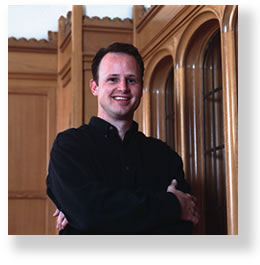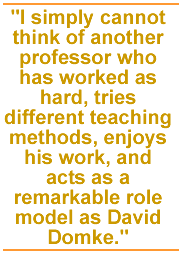
Distinguished Teaching Award

David Domke
Students remember the day George Stephanopoulos came to class. He presented a lecture, talked about working the West Wing of the White House, and even plugged his book, which, oddly, had Communications Professor David Domke's picture plastered on the cover. Now that you mention it, that wasn't Stephanopoulos at all, but Domke giving his class a lesson in politics and humility.
Former reporter-turned-communications-teacher Domke uses inventive ways to engage his classes, such as taking on the roles of Stephanopoulis and Minnesota Governor Jesse Ventura. "I don't talk like the people I'm impersonating, but teach from the person's perspective, giving the lecture that they would give because of their knowledge and history and expertise," Domke says. "The students really buy into it and ask me questions as the person."
Senior Margaret Stevens describes the effect it had on her. "A year later, I still remember all of Stephanopoulos' spin tactics and Ventura's remarkable campaign strategies." Stevens adds, "I simply cannot think of another professor who has worked as hard, tries different teaching methods, enjoys his work, and acts as a remarkable role model as David Domke."
Even though he dons someone else's hat a couple of times a year and students love it, it's always a stretch for him, Domke says. "It terrifies me. But if I'm going to ask students to stretch themselves intellectually, it's important that they see me doing it. It's a risk, but I have to be willing to fail in front of them."

Another specialty of Domke's class is the weekly Stump the Professor exercise. In STP, as his students refer to it, class members come up with questions based on current affairs. The teaching assistant chooses a question, which Domke doesn't see beforehand, and he has 90 seconds to come up with an answer. Then the student reads his or her own answer and the class has an opportunity to polish it. The TA decides whose answer is better.
"I lose about 95 percent of the time," Domke says. "At first the terror was that they wouldn't think I was very smart. As a teacher, you want to protect your superiority of knowledge." But his students appreciate that he sets himself up for possible humiliation, and they respond by working hard on the assignment. "Some of their questions are amazing," Domke says. "I'm impressed with their research and their answers, and I tell them so."
Back in the early '90s, Domke was a reporter for the Atlanta Journal & Constitution, but didn't feel fulfilled, he says. Since his father and two of his sisters are teachers, he saw the impact they had on the lives of young adults and decided to pursue teaching. He'd planned to teach journalism at the community college level, but as he worked on his master's degree, he picked up a passion for research, which led him to a doctorate. "I thought I could teach college because I understand research and thought I could effectively teach 18- to 25-year-olds," he says. He joined the University in 1998, where he developed a reputation as an outstanding teacher, if not a performer.
"Part of his success," says Robert Tynes, a former student and TA, "rests in his ability to connect with students one-to-one, even though they sit among hundreds of others in the classroom. Students want to attend his class. Professor Domke's teaching sparks interest in the subject matter and, consequently, students become eager to learn."
On the first day of every class, Domke promises his students that they'll never wonder if he wants to be there—he does. And he wants them to be there, too. "In a large classroom, it's not really the numbers that count, it's knowing that somebody cares that you're there," he says.
Senior David Ko '02, says, "I soon became unaware of the size of the class and developed an affinity to Professor Domke's style of teaching and his challenge to his students to excel, not only in academics, but in life."
Domke finds satisfaction in his work now, he says. "I have tremendous joy in seeing students believe in themselves. If I can get them to see their own possibilities, to see themselves as people who make a difference, that's as important as acing a test."—Beth Luce